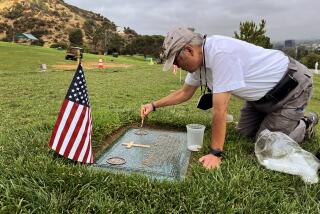Mercy or Murder? : Ailing Couple’s Suicide Pact Ends in Possible Trial
- Share via
Gladys and Jay McFadden started recording their suicide pact on a Wednesday last January, dictating their goodbys into a portable cassette player.
Gladys, 61, had suffered from progressive multiple sclerosis since 1976. Jay, 63, had been partially paralyzed and barely able to speak since a 1985 stroke.
On the Saturday night of July 18, they divided the sleeping pills they had hoarded, swallowed them and lay down to die. On Sunday they awoke.
So they recorded another installment and pulled out Jay McFadden’s old handgun. According to his attorney, he held the gun and she pulled the trigger. She fell back on the bed, dead. He dropped the gun.
Then, because the stroke had destroyed his short-term memory, he forgot what to do next. In a panic, he called 911. He was arrested on suspicion of murder.
Jay Ward McFadden sat quietly in Orange County Municipal Court during a preliminary hearing Wednesday to decide whether he will be tried. With his cane beside him and his gray head bowed, McFadden barely moved as a coroner described the destruction the .38-caliber Ruger did to his wife’s body.
“There was an explosion type of wound,” said Joseph D. Luckey, an Orange County coroner’s investigator. “There was sooting from the gunshot on her chest, and her clothing was torn severely. There was tissue on the walls and ceiling. . . . The muzzle of the weapon was probably right against the tissue or in close proximity.”
But McFadden broke down during a recess in the hearing, as the attorneys spoke of mercy and murder, law and love.
“The law does not make any concession for mercy killing,” said Deputy Dist. Atty. Jeoffrey L. S. Robinson, as McFadden’s sobs echoed in the courtroom. “When the evidence was brought to our office, we had no choice but to file a murder charge. . . . But it’s difficult to prosecute someone who is a decent human being, who committed an action for no gain.”
But Carol E. Lavacot, McFadden’s public defender, said she thinks that “the evidence is much stronger for suicide than murder.”
“There is enough evidence to show he assisted her in taking her own life,” Lavacot said. “I think he held the gun and she pulled the trigger with her left thumb. There were high levels of gunshot residue on both sides of her hands.”
When the police arrived at the Dallas Drive house in Garden Grove, they found Jay McFadden in a stained white T-shirt and white jockey shorts and sobbing hysterically. Gladys was sprawled in bed, her pink nightgown stained with blood.
In testimony Sept. 5, when the preliminary hearing began, Garden Grove Police Sgt. Phil Mason said police at the scene asked McFadden if he had shot his wife.
Mason said McFadden answered, “Yes.” Mason said he posed the question again, this time asking for a written answer, and that McFadden scrawled, “Yes.”
But Kathy Ciccarelli, 34, the McFaddens’ daughter, said in an interview that her father may not have meant to answer with an unqualified “yes” when he was questioned by Mason.
“Because of his stroke, he can’t really talk,” Ciccarelli said. “We have to make three or four requests to get a good answer. And he can’t control the few words he says.”
His vocabulary is confined to “yes,” “no,” “hello” and a few other words, Ciccarelli said.
Despite his stroke, Jay McFadden, a former advertising executive, was able to care for his wife, a former teacher, much as he had done since her illness was diagnosed nearly 10 years ago. He could still dress himself, clean the house, water the lawn and do the laundry.
But his stroke made the couple fear for their future. After 37 years together, they could not bear the thought of being apart, Ciccarelli said. One of her mother’s greatest fears was being in a nursing home with someone other than him to smooth her sheets.
“The tape was my mother’s last will and testament and explained what they were planning on doing and why,” Ciccarelli said. “My mother said: ‘I’m in agony most of the day, and I no longer want to live. I’m not living. I’m just existing.’ ”
The tape was made over a period of three days, Ciccarelli said. The Wednesday, Jan. 15, segment, she said, spelled out details of the couple’s pact and expressed their resolution to go through with the suicide. Essentially, she said, it was an explanation for ending two long, productive lives. The Saturday segment was mostly devoted to goodbys because the couple planned to die that night from overdoses of sleeping pills.
But about 15 seconds after the goodbys ended, after the elderly couple were supposed to be dead, Ciccarelli said, her mother’s voice came back on the tape:
“It is now Sunday, Jan. 18.”
Ciccarelli said the pills “made my mother sick, and to my father they did nothing. . . . What so many people need to understand is my mother’s avid desire to die. Can you imagine the horror waking up the next morning and you’re not dead?”
The last resort was Jay McFadden’s snub-nosed Ruger.
“The reason the suicide pact was not completed is because after she was gone, there was no one there to tell him what to do,” Lavacot said. “He was confused. . . . It was very traumatic for him. It’s hard to get close to those areas in questioning him. Gladys had to make the decisions. Jay agreed to them. But after that happened, he didn’t remember what to do next.”
The preliminary hearing was continued by Municipal Judge Alan N. McKone until next Friday because a key defense witness could not be reached Wednesday. According to Lavacot, a specialist in neuropsychiatry will testify that McFadden’s mental capacity was too impaired to allow him to kill his wife without her involvement.
On Wednesday, prosecutor Robinson said the charge against McFadden could be reduced if there is sufficient evidence that McFadden’s capacity was impaired.
“I’d like to see that evidence,” he said. “The defense is suggesting that the deceased was actively pushing on the trigger while the defendant was holding the weapon. . . . Our office takes the position that mercy killing is a crime and we have to prosecute. But this case, based on its unique facts, could offer some alternatives.”
More to Read
Sign up for Essential California
The most important California stories and recommendations in your inbox every morning.
You may occasionally receive promotional content from the Los Angeles Times.














